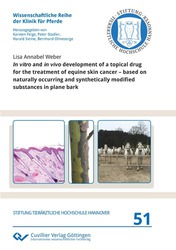| Areas | |
|---|---|
| Serie de libros (97) |
1381
|
| Nachhaltigkeit |
3
|
| Gesundheitswesen |
1
|
| Letra |
2370
|
| Ciencias Naturales |
5407
|
| Matemática | 228 |
| Informática | 319 |
| Física | 980 |
| Química | 1364 |
| Geociencias | 131 |
| Medicina humana | 243 |
| Estomatología | 10 |
| Veterinaria | 108 |
| Farmacia | 147 |
| Biología | 835 |
| Bioquímica, biología molecular, tecnología genética | 121 |
| Biofísica | 25 |
| Nutrición | 45 |
| Agricultura | 1005 |
| Silvicultura | 201 |
| Horticultura | 20 |
| Ecología y conservación de la tierra | 148 |
| Ciencias Ingeniería |
1798
|
| General |
98
|
|
Leitlinien Unfallchirurgie
5. Auflage bestellen |
|
Erweiterte Suche
In vitro and in vivo development of a topical drug for the treatment of equine skin cancer – based on naturally occurring and synthetically modified substances in plane bark (Volumen 51) (Tienda española)
Lisa Annabel Weber (Autor)Previo
Lectura de prueba, PDF (260 KB)
Indice, PDF (160 KB)
Equine sarcoids (ES) and equine malignant melanoma (EMM) are among the tumors affecting horses diagnosed most frequently. Both cutaneous neoplasms can be a significant cause of economic losses, morbidity and mortality in the animals. The treatment of equine skin cancer can be challenging and established, evidence-based therapies resulting in sustained tumor regression are rare. The pentacyclic, lupane-type triterpenes betulinic acid (BA) and betulin can be isolated from many botanical sources, predominantly from the bark of white birch and plane trees. In addition to various biological properties, they have gained attention mainly due to their anticancer features. Within the framework of the current PhD project, the compounds BA, BA derivative NVX-207, and betulin derivative betulinyl-bis-sulfamate were assessed in various in vitro and in vivo studies for their potential as a topical therapy for ES and EMM. In conclusion, the results generated from cell culture experiments, skin permeation assays and studies in the target species are promising. Further advancement of the investigational medicinal products studied herein could lead to an effective topical and marketable, novel drug which helps to relieve suffering and, consequently, improve the welfare of equine skin cancer patients.
| ISBN-13 (Impresion) | 9783736974326 |
| ISBN-13 (E-Book) | 9783736964327 |
| Formato | A5 |
| Idioma | Inglés |
| Numero de paginas | 140 |
| Laminacion de la cubierta | mate |
| Edicion | 1. |
| Serie | Wissenschaftliche Reihe der Klinik für Pferde |
| Volumen | 51 |
| Lugar de publicacion | Göttingen |
| Lugar de la disertacion | Hannover |
| Fecha de publicacion | 25.05.2021 |
| Clasificacion simple | Tesis doctoral |
| Area |
Veterinaria
|
| Palabras claves | Betulinsäure, NVX-207, Betulinyl-bis-sulfamat, Betulinsäure-Derivate, Triterpene, Pentazyklische Triterpenoide, Triterpene vom Lupantyp, Natürliche Wirkstoffe, Synthetisch modifizierte Wirkstoffe, Pferd, Equiden, Onkologie, Hauttumor, Neoplasie, Kutane Neoplasie, Melanom, Equines malignes Melanom, Schimmel, Equines Sarkoid, Platane, Birke, Rinde, Zellkultur, Zellkulturtest, Primärzellen, Fibroblasten, Krebszellen, Franz-Diffusionszelle, Permeationsversuche, Konzentrationsprofile, in vitro Versuch, in vivo Studie, Verträglichkeitsstudie, Wirksamkeitsstudie, Topische Behandlung, Topisches Medikament, Salbe, Creme, Behandlung, Therapie, betulinic acid, NVX-207, betulinyl-bis-sulfamate, betulinic acid derivatives, triterpenes, pentacyclic triterpenoids, lupane-type triterpenes, naturally occurring substances, synthetically modified substances, horse, equids, oncology, skin tumor, neoplasia, cutaneous neoplasia, melanoma, equine malignant melanoma, grey horse, equine sarcoid, plane tree, white birch tree, bark, cell culture, cell culture assay, primary cells, fibroblasts, cancer cells, Franz-type diffusion cell, permeation study, concentration profile, in vitro experiment, in vivo study, safety study, efficacy study, topical treatment, topical drug, ointment, cream, treatment, therapy |
| URL para pagina web externa | https://www.tiho-hannover.de/kliniken-institute/kliniken/klinik-fuer-pferde/team/innere-medizin/lisa-weber-phd |








